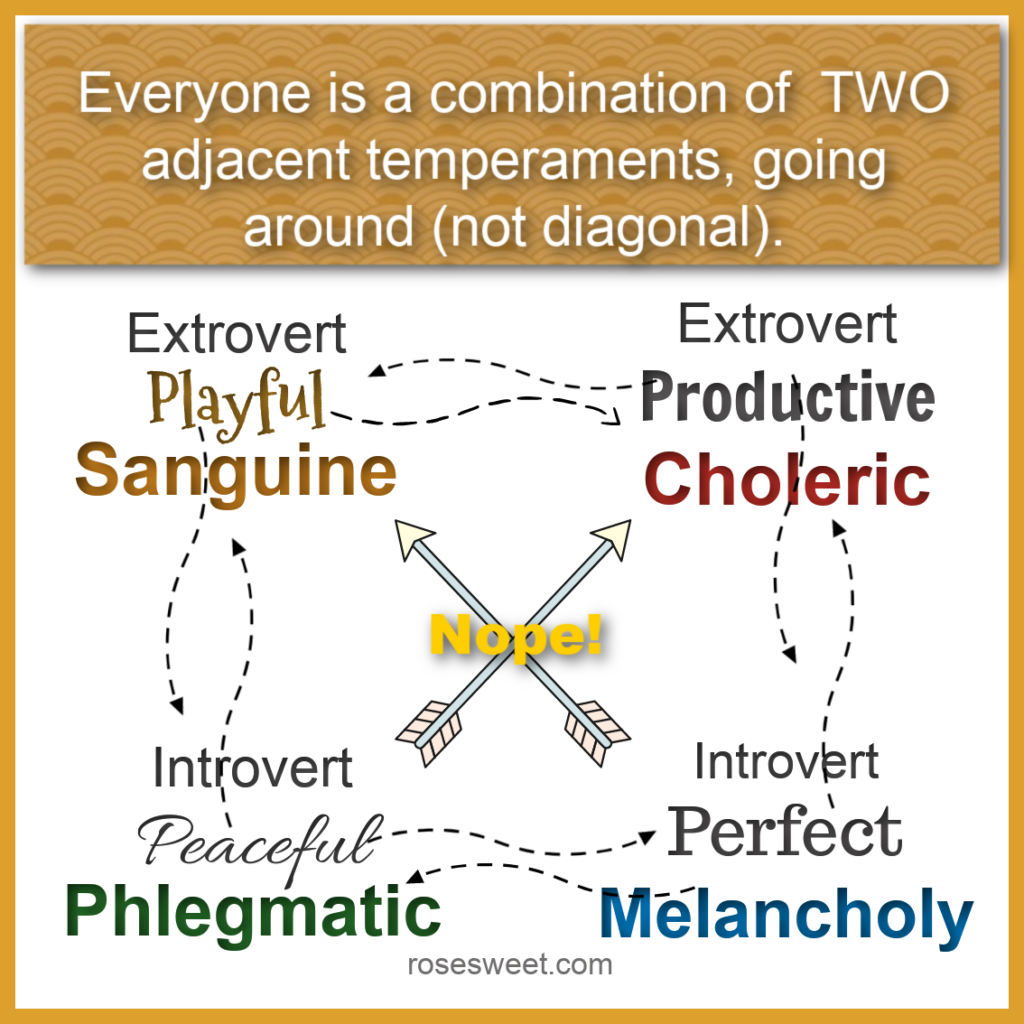Rose Sweet
Rose Sweet

Arf! Arf! Meow-w-w . . . Sometimes people of different temperaments may as well be speaking different languages!
Do you know or live with someone whose “personal dialect” is very different than yours?
What’s a temperament?
Temperament is how you’re hard-wired to see yourself in the world and how you naturally react to life and others.
- Optimist, pessimist, or a bit of both.
- Naturally sweet and sunny, or more cautious and suspicious.
- Loud or quiet. Light or intense.
All of these opposite attitudes/traits can be good or not-so-good, depending on the circumstances. You were born with a set of default tendencies that are meant to serve you well in life, bring you to holiness, and be a gift to others.
Do temperaments change?
Certain responses and behaviors can be learned, developed, and adopted, but your temperament is innate.
God wants you to know, enjoy, and use the temperament he gave you. It doesn’t mean you are stuck in a box but it means there are certain traits that will come to you much more quickly and easily than others. And that’s a good thing!
Your mood can change.
Your emotions can change.
Your personality can change.
Your character can change.
But not your temperament. Consider unchanging temperament as the raw material from which all these can flow and upon which they can build.
What does temperament measure?
Your innate (default) attitude, desires, and reactions; in general:
SPEED – do you naturally think/act quickly or more slowly and carefully?
INTENSITY – do you think/act/ hold beliefs firmly or fluidly/gently?
DEPTH – do you think/act/ hold beliefs at a deep level or a lighter level?
DURATION – are your responses short-lived or long-lasting?
None of these reactions are inherently superior to any other, and are necessary and even virtuous in the right circumstance!
How many temperaments are there?
Four, and they come in two sets of opposites that complement each other. Like North and South, East and West. Winter or summer, spring or fall.
You can be one of the sets of opposites, but not both. (Just like you can drive Northwest, but you can’t drive North-South!) In a nutshell:
- Choleric is loud, fast, high energy, and quickly takes charge.
- Phlegmatic is quiet, careful, balanced, and supportive.
You were born with one of these as part of your temperament, but not both.
- Melancholy is sensitive, curious, passionate, and loyal.
- Sanguine is silly, loud, playful, and a little fickle.
You are one of these, in combination with one of the top two. More detail and a quick test HERE.
Isn’t four rather limiting?
You are unique and unrepeatable and there is no one who has ever existed, nor will there ever be, who is like YOU.
But that uniqueness doesn’t preclude being in a category that many others share. Millions of people who are unique are nonetheless all men. Or women. Or who share the same blood type. Or have the same eye color. These common features do not limit their uniqueness and actually help us get to know something about them “at a glance.”
When you start to create a specific category for every unique person, you can end up with an endless number of “types” and a lot more error.
Temperament tests are nothing new
There are lots of temperament tests out there and you may have taken one in school or for work. The Myers-Briggs model is popular (ESTJ, INFP, and so on) but with over sixty-four different possible combinations, it can get overwhelming and leave room for lots of error.
Others use numbers, colors, or animal names but the one thing they have in common is that most are rooted in the clearest and simplest of all: the timeless teaching of the FOUR TEMPERAMENTS. We first received them from Hippocrates around 350 B.C.
Hippocrates was a medical doctor and an astute observer of human nature. He observed his patients when they were stripped of pretense and social constructs, without their “makeup” as it were, and saw the true temperaments emerge. Four of them. Each set of two opposites.
The deep, worried one and the light, silly one.
The loud, explosive one, and the slow, steady one.
Hot and cold, light and dark.
Temperaments are part of God’s creative design
Hippocrates attributed each behavior pattern to an excess of some particular body fluid. Today we know that his guess at their origin was primitive, but he was on to something: people are born with their temperament and it is as natural to them as their blue eyes or brown hair. It could be masked, but it is ever-present and unchanging.
God is a Designer and, in nature, we see his patterns of a (1) whole unity with (2) four distinct but separate parts: the four directions, four elements, the four seasons, and more.
God himself is ONE but MULTIPLE within the one (Father, Son, and Spirit). It’s a mystery, the depth of which we will never fully grasp now but can generally see and understand.
When God said, “Let US make man in OUR image”, it’s not unreasonable to see that we, too, are one but with different, distinct dimensions of self. Temperaments are reflections of something of God and we all get to share in them!
Your temperament is your unique set of preferences and desires
Some want peace at any cost.
Some would rather have attention.
Others want to be understood most of all.
Knowing these will give others a clue as to how to best understand and relate to you. Through this lens, you, too, can better understand what motivates others.
- Why do they do that?
- How can I get them to understand?
- How can I speak their “language?”
- (And why can’t they understand mine?)
Your temperament is one way you’re made in God’s image
We bring opposite and complementary facets into the world. Each temperament is a beautiful share in God’s divine nature: his boldness, his gentleness, his depth, and his light.
It’s only pop-psychology when you don’t understand the richness it can bring to relationships, or when it is misunderstood and wrongly applied. For over forty years I’ve successfully tested and relied on it for:
- Seeing how we are truly “made in God’s image”
- Understanding the deepest emotional needs of each four types
- Knowing how to speak another’s “heart language”
- Learning how to best parent each of your children
- Falling more deeply in love with your spouse
- Maximizing your work team and company production
- Knowing we don’t have to take others’ actions so personally
- Appreciating and focusing on the gifts that God gave YOU
…and so much more
I’m in good company: St Thomas Aquinas, St. Teresa of Avila, and many more saints and mystics relied on the study of temperaments as a spiritual aid for centuries. Like any truth, it has initial layers and those that are deeper. If you’re interested in more, here are a few quick tips for now:
Aren’t temperaments just a label?
If I tell you I am a Catholic, Author, Baby Boomer, and Dark Chocolate Snob, those labels in no way “put me in a box” or squelch my individuality. They quickly help you see and understand something more about me that you may not know.
With food, cleaning supplies, or blood types, labels can be life-or-death necessary! People who object to labels are usually hesitant to be exposed or worried they might be too quickly or simply categorized. We are each unique and complex and it’s true that no one should ever be reduced to a label.
The motive is the clue
If you’re trying to identify yourself or someone else, be careful. Everyone can be bossy, sad, happy, have fun, or be creative, but in different ways, at different times, and for different reasons.
Cherry-picking one or two words out of the list of personality strengths or weaknesses is myopic. This age-old knowledge will be harmful rather than helpful if you too-quickly slap that label on yourself or others.
No temperament is superior
Like the four chambers of the human heart (two in, two out) that work together to sustain life, God divided some of his beauty and strengths among us so that we, too, could work in unison to sustain life and love. We are all necessary. All beautiful. All powerful.
Are you still curious? Go HERE to take a quick temperament test. Enjoy!
***
Want to book a Day of Retreat or Parish Mission on this topic? Go HERE








